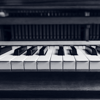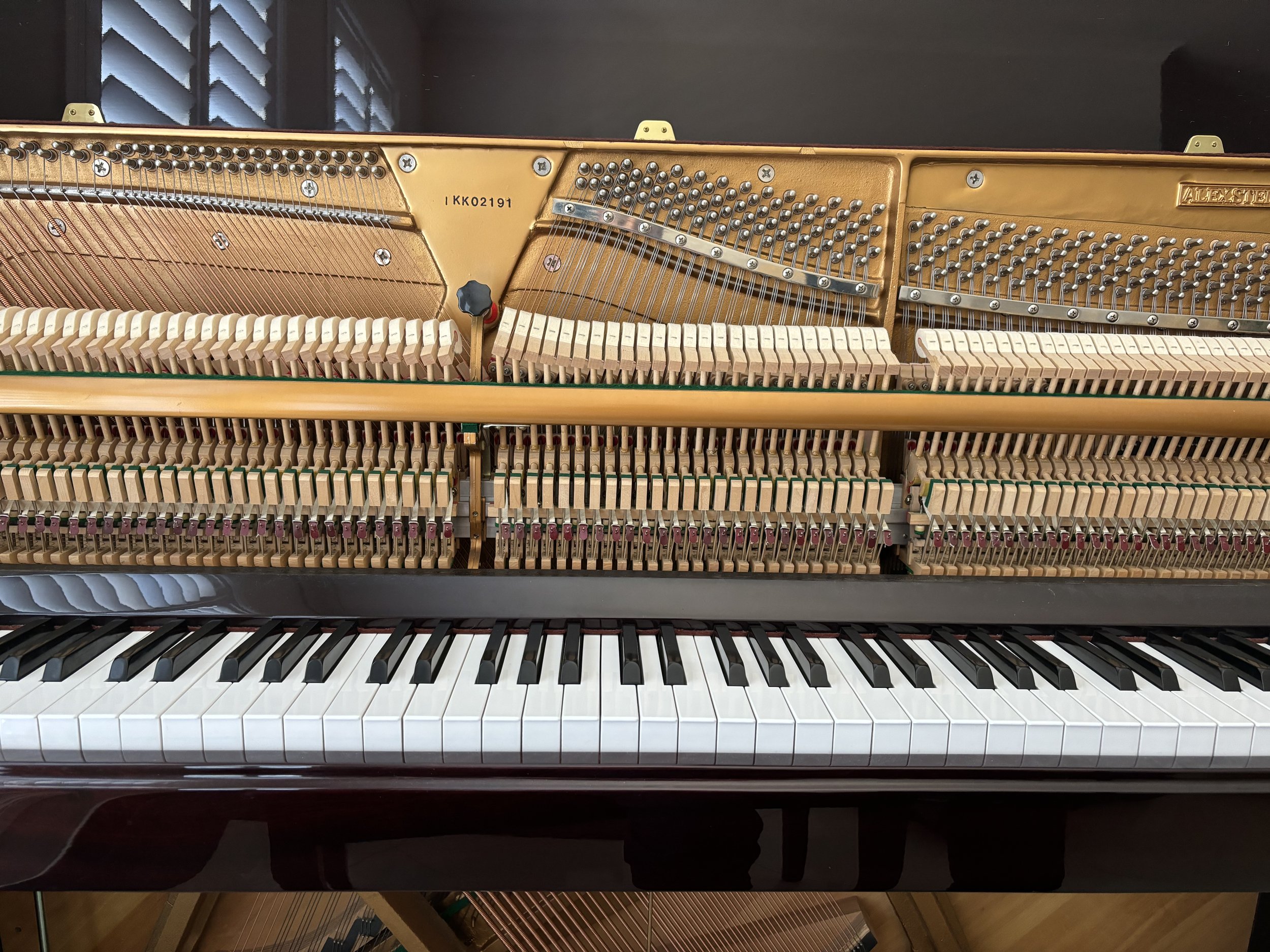Piano Tuning Service In Greater Sydney That You Can Trust
Magico Piano Tuning Offers Professional Piano Tuning For Sydney Homes, Schools & Musicians
We are dedicated to providing exceptional piano tuning service to our valued customers. As one of the best local piano tuner and technician in Sydney we offer professional piano tuning, repair, voicing and actions regulation services for both upright and grand pianos. Fully insured and have valid Working With Children Check. Accredited by China National Light Industry Council and China Musical Instruments Association as advanced piano technician/piano tuner.We take pride in our commitment to delivering high quality piano services with continuous improvement to our services and constant care to our customers’ beloved pianos. If you want to find the best piano tuner near you just give us a call or book your piano service online using our website.
Piano Tuning Prices For Upright & Grand Pianos
When you practise on a piano that’s out of tune, your brain starts to accept the wrong pitches as “normal.” Over time, this can harm your sense of pitch and make it harder to play in tune—whether on piano or any other instrument.
A beautiful sound inspires you to play more. An out-of-tune piano makes music sound dull, harsh, or sour, which can sap your motivation and make practice feel like a chore instead of a joy. If you’re a beginner or teaching a child, an out-of-tune instrument can make it harder to recognise harmonies, intervals, and correct note relationships—slowing down your learning curve significantly.
Playing on an out-of-tune piano is like training for a race in shoes that don’t fit—you’ll put in the hours but end up with worse results and possibly lasting damage.
Book your piano service today!
Stop Practising On Out Of Tune Piano,Let Your Local Piano Tuner Help you
We’re delighted to be supported by Horizon Music Academy, a trusted Sydney-based music school that shares our passion for quality and musicianship. Their tailored piano and string programs help students build solid technique and expressive playing — all in a fun and nurturing environment.
Locations include: Carlingford, Fairfield, Epping and Cherrybook.
Find out more at HorizonMusicAcademy.com
Piano Tuning Cost in Sydney: What You Need to Know
If you own a piano, tuning is one of the most important aspects of its care. Over time, even the best pianos gradually go out of tune as strings stretch and wood reacts to changes in humidity and temperature. Many piano owners ask the same question before booking a service: how much does piano tuning cost?
In Sydney, the cost of piano tuning can vary depending on the type of service required, the condition of the instrument, and the experience of the piano tuner. This guide explains what goes into piano tuning costs, why prices differ, and what you can expect to pay when you schedule your next tuning.
Why Is Piano Tuning Necessary?
A piano is not like a digital instrument that stays perfectly in tune. Each of its 200+ strings is under high tension, and slight changes in the environment can cause them to drift. Over time, this drift accumulates, and the piano starts to sound flat, sharp, or uneven.
Regular piano tuning ensures that your instrument maintains its correct pitch and sounds its best. Without it, not only does the sound suffer, but the piano also becomes harder to bring back into tune later, which can increase the cost of servicing.
Average Piano Tuning Cost in Sydney
The average piano tuning cost in Sydney generally ranges between $180 and $250 for a standard tuning. This is the cost for a well-maintained piano that has been tuned within the last year and only requires fine adjustment.
If the piano has been neglected for many years, or if the pitch has dropped significantly, the cost may be higher. In such cases, a tuner will need to perform what is called a pitch raise. This involves tuning the piano roughly up to the correct pitch first, then fine-tuning it again. Because this takes longer and puts more strain on the strings, the pitch raise piano tuning cost can be between $250 and $350.
Factors That Affect Piano Tuning Cost
Several factors influence the final cost of tuning your piano.
The condition of the piano plays the biggest role. A piano that is regularly serviced will only require a simple fine tuning, while one that hasn’t been tuned in 10 or 20 years will almost certainly need a pitch raise and perhaps additional work.
The type of piano also matters. Upright pianos are generally quicker to tune than grand pianos, which have larger string lengths and more complex mechanisms.
The location can have an impact as well. If you live outside central Sydney or in a remote suburb, there may be a small travel surcharge.
Finally, the services included may affect cost. Some tuners include minor regulation, small adjustments to the action, or advice on care as part of their tuning service, while others charge separately.
Additional Costs Beyond Tuning
In some cases, tuning is not the only service your piano may need. Sticky keys, sluggish pedals, or worn hammers are common issues that require repair or regulation. These services are typically quoted separately.
If strings are badly rusted or break during tuning, restringing may be required. While rare, this can add significant cost. However, for high-quality instruments such as Yamaha or Kawai uprights, or Steinway grands, the investment is worthwhile.
How Often Should You Tune Your Piano?
Many piano owners ask whether it’s worth paying for tuning once, or whether it needs to be done regularly. The truth is that regular tuning reduces long-term cost. A piano that is tuned every 6 to 12 months is easier to maintain and requires less work each time.
When a piano is left untuned for many years, the pitch drops too far, requiring a more expensive pitch raise. By keeping to a consistent tuning schedule, you not only save money but also preserve the value of your piano.
Is Piano Tuning Worth the Cost?
Some people hesitate to spend $200 or more on piano tuning, but it is one of the most cost-effective ways to keep your instrument playable. A piano that is out of tune is discouraging to play and can make practice difficult, especially for students. Regular tuning ensures that your piano always sounds harmonious and supports musical growth.
If you have invested in a piano—whether it’s a modern Yamaha upright, a vintage German grand, or a family heirloom—the relatively small cost of tuning protects that investment and ensures you enjoy it for years to come.
Choosing the Right Piano Tuner
Not all piano tuners charge the same rates, and not all offer the same level of service. When comparing piano tuning cost, it’s important to also consider expertise, professionalism, and reviews. A highly experienced tuner may charge a little more, but will often provide better results and longer-lasting stability.
At Magico Piano Tuning, we provide expert piano tuning services across Sydney. Whether your piano has been maintained regularly or neglected for decades, we can bring it back to life at a fair and transparent price.
When searching for piano tuning cost Sydney, remember that value is more than just price. A skilled tuner ensures your piano sounds beautiful and stays stable, protecting your instrument for the long term.
If your piano hasn’t been tuned in years, now is the perfect time to book a professional service. Contact Magico Piano Tuning today to bring your piano back to its best.
You don’t need magic to make your piano sound good
Regular piano tuning by a dedicated piano tuner is the key
Years ago, I came across an old German Mignon piano—faded, worn, and far from in tune. Was about to find a professional piano tuner, however out of curiosity (and a bit of stubbornness), I decided to bring it back to life myself. Armed with a tuning hammer, borrowed tools, and countless late-night YouTube tutorials, I dove in. What began as a simple DIY repair turned into an obsession with the craft—the delicate mechanics, the satisfying ring of a well-tuned note, the joy of reviving an instrument’s voice. That single project sparked a new path, and before long, I wasn’t just fixing my own piano—I was tuning and repairing pianos for others, one string at a time.
Can a Piano Be Tuned After 20 Years?
For many piano owners, life gets busy and the instrument sits quietly in a corner, untouched for years. Then one day, inspiration strikes—perhaps a child wants to learn, or the owner rediscovers their love of music. But if that piano has been left untuned for 20 years or more, the first question that comes to mind is: Can it still be tuned?
The short answer is yes, but the long answer involves a closer look at the condition of the piano, the effects of time and environment, and the specialist techniques a professional piano tuner uses to bring such an instrument back to life.
What Happens to a Piano Over 20 Years of Neglect?
A piano is a highly complex mechanical and acoustic machine, with more than 200 strings and over 10,000 moving parts. Like any precision instrument, it requires regular maintenance. When left untuned for 20 years, several things are likely to have happened. The most common issue is pitch drift. Standard concert pitch is A440 Hz, but over two decades without tuning, the strings will have loosened and the piano’s pitch may have dropped significantly—sometimes by half a semitone or even a full tone.
The soundboard and pinblock are also affected by time. Wood is sensitive to humidity and temperature. Over the years, fluctuations can cause the soundboard to swell, shrink, or even crack. The pinblock, which holds the tuning pins in place, may also loosen, making it harder for the piano to hold a stable tune.
Strings are another vulnerable part of the instrument. Dust, moisture, and oxidation can leave them rusted or fragile. In some cases, strings may snap during tuning, especially if a significant pitch correction is attempted too quickly. Beyond the strings, the action of the piano often suffers. The felt hammers can harden and grooves may form in the hammer heads. Keys can stick due to dust or humidity, which impacts playability and tone even before a tuning attempt is made. Pedals and other mechanisms, left unused for decades, can also become sluggish.
Is It Possible to Tune a Piano After 20 Years?
The reassuring news is that yes, a piano can still be tuned after 20 years, but it requires more than a routine tuning. Most long-neglected pianos will need a process known as a pitch raise, or double-tuning, in which the instrument is gradually brought back up to standard pitch in stages. A single tuning session is rarely enough. Instead, the piano often needs multiple tunings spread out over several months before it stabilises.
There is always the risk of string breakage, particularly if the instrument has rusted or fragile strings. A tuner will proceed cautiously, but some strings may still need to be replaced. Another important factor is structural integrity. If the soundboard or pinblock is badly damaged, the piano may not be able to hold a tune at all. In these cases, repairs or restoration may be needed before tuning can begin.
The Process of Tuning a Long-Neglected Piano
A professional piano tuner approaches such a job with patience and care. The first step is inspection. Our piano technician will check the condition of the strings, pinblock, soundboard, and action, and measure how far below pitch the piano has dropped. If the piano is very flat, for example at A415 instead of A440, our pinao tuner will perform a rough initial tuning to bring it closer to standard pitch. This stabilisation stage is not a precise tuning, but rather a necessary adjustment so that the piano can withstand finer tuning.
Once the piano is closer to standard pitch, our piano tuner carefully fine-tunes each string. Even after this careful work, the piano will usually drift again as the strings adjust to the increased tension, so follow-up tuning is essential. With each session, the piano grows more stable, until eventually it can hold its tune reliably again.
When Is Restoration Needed Instead of Just Tuning?
There are times when a piano cannot simply be tuned after 20 years and requires more substantial work. This is often the case when tuning pins are loose and unable to hold pitch, when the soundboard is cracked and producing unwanted noises, or when strings are so rusted and broken that tuning is no longer viable. Action problems, such as non-functioning keys or severely worn hammers, may also push a piano into the category of restoration rather than straightforward tuning. In these situations, our piano tuner may recommend partial restoration, such as restringing or hammer replacement, or even a full rebuild if the piano has significant sentimental or financial value.
Is It Worth Tuning a 20-Year Neglected Piano?
Whether or not it is worth tuning a piano after two decades depends on several factors. The brand and model are important. High-quality pianos from makers such as Yamaha, Kawai, Steinway, or Bechstein are almost always worth restoring and tuning, even after decades of neglect. Cheaper uprights from lesser-known brands may not justify the cost of extensive repairs.
Sentimental value often outweighs financial logic. A piano handed down through generations may be worth saving no matter the cost. Musical goals also matter. If the piano is to be used for casual practice at home, a pitch raise and basic tuning may be sufficient. For professional use or exam preparation, it needs to be brought all the way to concert pitch and tuned to stability.
Alternatives: Tuning at a Lower Pitch
Sometimes, the piano simply cannot withstand the stress of being pulled back to A440. In these cases, our piano tuner may suggest tuning to a lower stable pitch, such as A432. Although it will not match other concert instruments, it can still sound pleasant and be perfectly usable for practice and enjoyment at home.
How Much Does It Cost to Tune a Piano After 20 Years?
The cost of tuning a long-neglected piano varies depending on its condition and the region. In Sydney, we charge $240 for a standard tuning. If a pitch raise is required, the price is $300 this also includes fine tuning. Because neglected pianos need more than one tuning to stabilise, owners should expect at least two or three visits within the first year. Any necessary repairs, such as replacing broken strings or fixing action problems, will be an additional cost.
Caring for a Piano That Has Been Silent for Decades
Owners of long-neglected pianos should be mindful of a few important points. Attempting to tune a piano yourself is never advisable. With each string holding between 70 and 90 kilograms of tension, DIY efforts can cause serious damage or even injury. Professional tuning is essential. The environment of the piano also plays a huge role in its longevity. It should be kept in a stable room, away from heaters, air conditioners, or windows. Controlling humidity will help prevent sticky keys and further damage to the soundboard.
Patience is also key. After two decades of neglect, tuning stability cannot be achieved in one session. The instrument must be allowed to “wake up” slowly. Once restored, regular maintenance should be maintained, ideally with annual or biannual tunings, to prevent the same decline from happening again.
So, can a piano be tuned after 20 years? The answer is yes, but the process requires time, patience, and the expertise of a professional piano tuner. A pitch raise, follow-up tunings, and possibly minor repairs are usually needed before the piano can hold its tune once more. For high-quality or sentimental pianos, the investment is almost always worthwhile.








